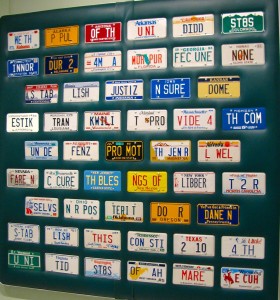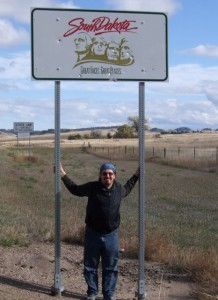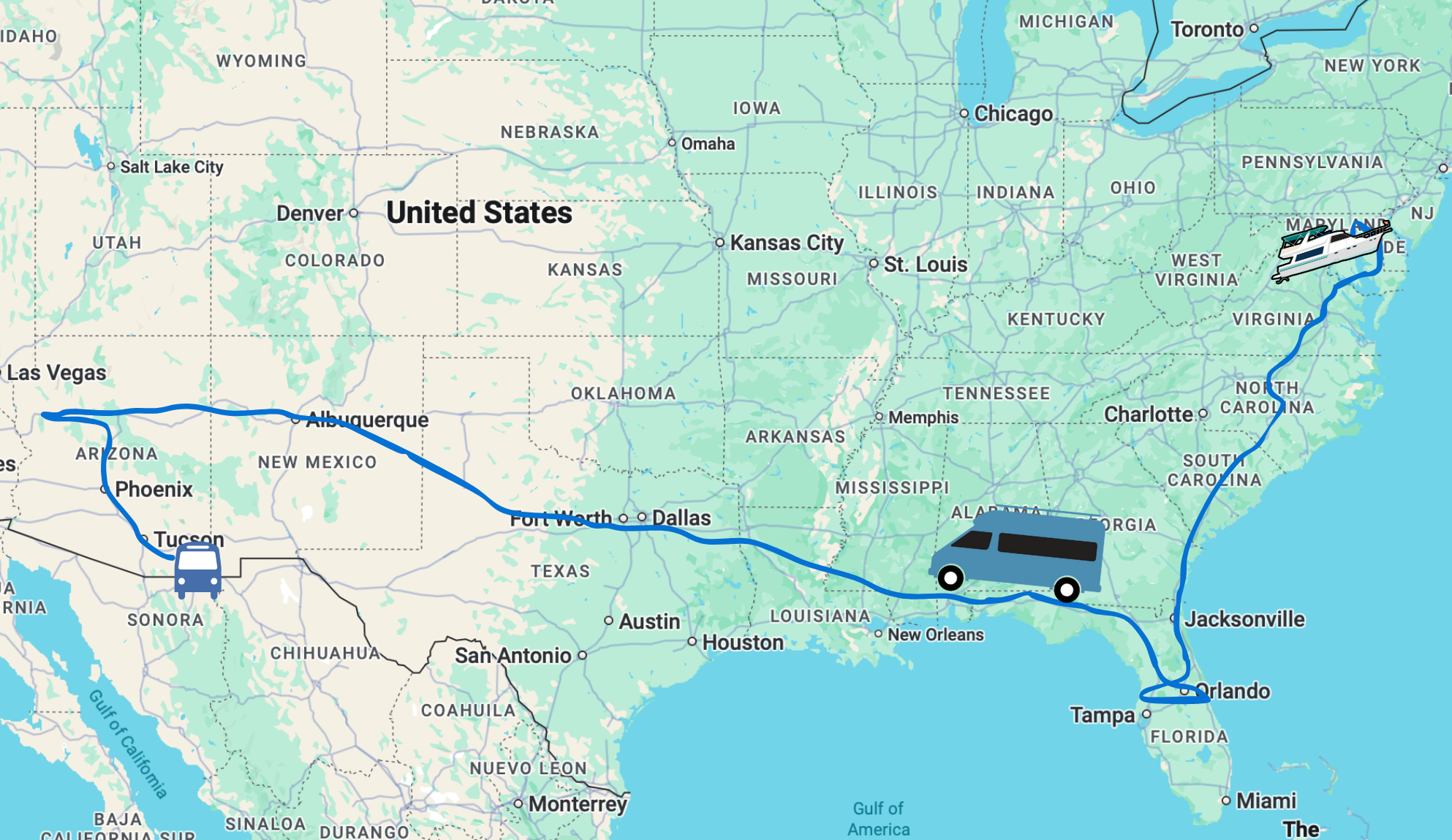
<— Read Chapter 8: Nomadic Romance, Sex & RelationshipsRead Chapter 10: Nomadic Money – Banking, Finances & Taxes –>
Mail. Bills. Voting. If you’re a nomad wanting to remain all legal-like, you’ll need to take all these things into account. How does one handle all of these logistical things when you don’t have a physical fixed home address? Answering questions about how we get our mail is surprisingly one of our most frequent questions!
It’s amazing how many mundane details in life are dependent upon having an address.
When contemplating becoming intentionally homeless and embarking on a life of travel, trying to muddle through all of these simple little details can begin to seem insurmountable. But never fear — you don’t have to let a little red tape keep you tied down. There’s always a way around, and it really isn’t even all that complicated.
The first step is deciding where you want to be ”from”. Smartly setting up this ”home base” can give you a strong foundation to travel from.
Picking a Domicile State
Please note… domicile is a complex legal topic that you need to carefully consider. We are not lawyers and the only advice we’re giving here is that you might need to seek one out to advise you. This is just our general understanding of the issues and considerations.

Most of the obstacles center around one critical choice — where will your legal permanent address be if you’re no longer maintaining a fixed home? Most everything you do, will require having a permanent address. For US citizens, you need a legal address to handle things like a driver’s license, vehicle registration, passport, banking accounts, credit cards, insurance, filing taxes and so on.
But before selecting that address, you need to first select which state you want it to be in . Since your legal address is no longer dependent upon your physical location — you get to choose which state to declare your intentions of being domiciled at. The state you originate your nomadic journey from may actually not be at all advantageous to you as a nomad – or it might be very advantageous, but difficult to establish as a new nomadic resident.
But first, let’s talk about the difference between being a Resident and being Domiciled. This was summed up nicely by the New York appeals court:
Residence means living in a particular locality, but domicile means living in that locality with intent to make it a fixed and permanent home. Residence simply requires bodily presence as an inhabitant in a given place, while domicile requires bodily presence in that place and also an intention to make it one’s domicile.
Each states sets its own rules as to what constitutes ‘bodily presence’, leaving you with the task of proving your intent. And it’s important to keep in mind – you are proving your intent not only to your new state, but also the state you are moving from – as well as any other state that may want to claim you for taxation.
Depending upon your unique situation, different states will make better sense for different people. If you’re earning an income, a state without a state income tax may be most appealing.
Of those, Texas, South Dakota and Florida tend to be the three most popular choices for their combination of benefits that support nomadic travelers and their ease of establishing your intent.
But income taxes alone shouldn’t be your sole deciding factor. Here are some other considerations to fully investigate for your situation which may trump paying some taxes:
-
- Insurance rates & accessibility (be sure to check not just for the state, but for the specific zip code – as these can vary widely even within a state)
- Vehicle registration fees & requirements (ie. will your RV need to registered as a commercial vehicle due to weight/length, or will driver’s need a special license?)
- Marriage, family, divorce and common-law rules
- Sales tax rates
- Taxation on dividends, retirement proceeds, capital gains and non-earned income
- Property taxes
- Corporate taxation & fees
- Homeschooling laws (Here’s a Book: Homeschool Legally While You Travel the USA)
- Time in state requirements (some require you to actually be in the state a certain amount of the time a year.)
- Inheritance laws & taxation
- Trusts and estate issues
- Vehicle inspection rules
- Jury duty obligations
- Driver’s license & tag renewal logistics (do you have to show up in person?)
- Where you own property and have existing connections
-

My protest on the courtsteps in SD over lack of ‘spaces’ in names. Availability of logistical support (such as mail forwarding services)
- What stage of your travels you’re in (already own your RV or boat? Sold your house? Planning an imminent major purchase?)
- Where you plan to spend most your time
- Will their computer systems spell your name right? (I was quite upset to learn that South Dakota – the place of ‘Great Places and Great Faces’ doesn’t allow SPACES in names on driver’s license. Umm.. hello??)
Obviously, this can be a very complex decision with a lot of variables that you’ll have to weigh. We sum up a few of the top reasons South Dakota, Texas and Florida are frequent choices of full-timers below – but this sort of information can quickly become outdated. For sure, do your research and be careful where you get your research. A lot of the resources you’ll find on the web may be several years out of date (including ours).
The rules for establishing residency in a state will vary widely by state, so it’s important to fully research the states you are considering for your situation. Some are more difficult than others, and the sequence of what you need to do first (get an address, driver’s license, register vehicles, etc.) can vary by quite a bit. New identification rules for getting a driver’s license can make it more and more difficult for a nomadic person to meet the requirements.
But by and large, it comes down to intent, especially when talking about establishing a domicile. And the more you do to establish the intent, the more bullet proof your residency is should it ever be called into question. It makes the most sense to use the same address for everything – identification, insurance, vehicle registrations, voting, tax filing, bills, bank & credit card statements, etc. The more you can cut ties with any other state (especially the state you are moving from), the more you are expressing intent of establishing your domicile. It also makes sense to establish as many connections near your new address as possible to prove your intent should it ever come into question.

What types of things might call your domicile into question?
- Owning property and/or living in a tax aggressive state if it appears your legal move was to dodge those taxes by establishing yourself elsewhere.
- Earning income in a state with aggressive income tax laws
- Vehicles registered in states other than your domicile
- Not fully proving to your former state of residence that you have fully cut ties
- Getting pulled over and telling the officer you’re working locally (a common indication of being a resident, the state may want you to register your vehicles)
- and more
You need to also be aware of what the local laws are for the places you actually find yourself staying at and have connections to. You may intend to be considered domiciled in, say, South Dakota – but if you spend most your time in a more tax-aggressive state you may find yourself unintentionally considered as a resident – and thus owing state taxes, or being ticketed for not having your vehicles properly registered (Here’s a guide from AAA that goes over vehicle registration rules for each state.)
If you’re going to be in a state regularly and long enough to meet their residency conditions, it may be a good idea to just setup your domicile there anyway.
Domicile is a complex topic that can have unintended consequences for you, so don’t take this lightly. Here’s the Escapees RV Club Guide to Domicile that we recommend following up with.
If you have circumstances that are anything but straightforward – it’s highly advised you consult a domicile savvy attorney or advisor for guidance.
It’s also a good idea to browse many of the full-time RVing, traveling or cruising forums to see what the experiences have been of others.
Picking a Legal Address
Ok, so now you’ve picked the state that it makes the most sense to be on your driver’s license and intend to call your legal home. Next step is to select what your actual address in that state should be.
First of all – no, you can’t use a US Postal Service PO Box as your primary address. Most states will not accept this on a driver’s license, and many services you’ll need won’t accept it either. They also don’t make a great mail forwarding option either.
Here are some possibilities to consider:
Using the address of a family member or friend
If you have connections to someone with a physical address in a state that makes sense for you, it may work out to ask a friend or family member if you can ‘live’ with them. At least, legally speaking.
Just be sure this is someone you trust to handle some of your legal affairs; as any official mail will likely be coming here – jury summons, tax notifications, legal documents, registration renewals and more. Discuss further if you’ll be using their address for all of your mail, and what they are to do with it when it arrives (hold it, scan it, trash it, forward it on)? Also, make sure they’re in a stable housing situation – if they move, that also means you have to move. And that can be a pain when you’re thousands of miles away.
Another consideration is that you’ll be legally considered part of their household – which means for any purposes of calculating total household income will now include yours and theirs. This could have negative unintended ramifications, such as if your added income disqualifies your friend or family member from receiving government benefits.
(If you opt for this route, don’t forget to thank your friend with an appropriate gift for the service!)
Mail Forwarding & Domicile Services for Travelers

In many states that are popular domiciles, there are services specifically setup to support us full time travelers. They act as both a legal address for use on driver’s license, federal & local taxes, vehicle registration, voting, insurance and more — and a mailing address that can forward your mail to you. Most of them can accept packages from all of the delivery services, making them quite practical. Some of them will scan and send you your mail electronically, provide you an online mailbox, notify you when you get an document you were expecting and even assist you in establishing your domicile (such as registering your vehicles remotely.)
The fees for these services are quite reasonable, generally starting at under $10/month for a basic package. To establish them, you just have to sign & notorize some forms giving the service authorization to accept mail on your behalf, and perhaps a limited power of attorney to handle your vehicle registrations.
Patriot Act Warning: Using a commercial mail forward service does have a downside. All financial institutions are required by the Patriot Act to have a residential address on file for their account holders, and the rules specifically disallow mail forwarding services & PO Boxes. So if you change your address (or open a new account) using your mail forwarding address – you will likely at some point be asked to provide it. Not doing so can lead to accounts being restricted or suspended from transactions (we’ve had this happen, even on accounts we’ve held for over 10 years using mail forwarding addresses). You are legally allowed to use a ‘next of kins’ address, even if you don’t live there. Have a residential address, preferably within your state of domicile, ready to go. Don’t try to explain to the institution your situation – they’re just filling in blanks, or it could raise red flags (we tried this once, thinking we’d carve a path for RVers, and it resulted in them not accepting our family member’s address without proof we lived there.)
For more information on this, check our article on: Handling Money & Finances on the Road
In the three most popular states, here are some of the most frequently recommended services:
South Dakota:
Advantages: No income tax, low vehicle excise taxes (3-4%), easy exemption from jury duty, no vehicle state inspections, lower insurance costs, can renew driver’s license (every 5 years) one time remotely.
Disadvantages: RVer friendly medical insurance policies are of very limited availability – pretty much only those who qualify for Medicare can get affordable coverage with an ACA compatible plan that covers them outside of the state for anything but emergency care (check RVerInsurance.com for the latest), annual vehicle registrations are charged by weight (adds up for motorhomes), must present campground or motel receipt when obtaining driver’s license and you must return in 5 years to renew your license (after that, it can be renewed online every other 5 years). Cold in the winter if you need to establish residency then or return for driver’s license renewals! New for 2025: Registering to vote requires being present at a single address in SD for 30 consecutive days first, and those using a mail forwarding address can only vote in federal elections.
- America’s Mailbox – In Rapid City, SD. An advantage to this service, they also operate a campground and guest house, which might make it easier for showing a receipt of address when you go to get or renew your driver’s license (a newer requirement in SD – us transients have to show a lodging receipt).
- Alternative Resources – In Sioux Falls, SD. This service is also frequently referenced on various RVing forums as being a reliable service that folks are happy with.
- Escapees RV Club – Through their ‘Home’ service they now offer domicile support in South Dakota. Your mail is still forwarded from their TX location, but they provide a SD address that can be used for things like driver’s license, vehicle registrtion and such.
Florida
- St. Brendan’s Isle – In Green Cove Springs, FL (Clay County), this is a service that is highly regarded in the cruising community and also assists travelers of all kinds. When we legally moved to Florida in early 2013, this is the service we used – and are extremely happy with them. They scan the front of the envelop as our mail arrives, and give us options to manage our mail online. We can even instruct them to open the envelop and scan the contents to read online – which is very time saving. (If you sign up with them, reference Technomadia or Chris Dunphy, and we’ll get a small referral credit.. thanks!).
- American Home Base – In Pensacola, FL, this service is also long established and frequently referenced as reliable. It’s also frequently referred to as the ‘Good Sam’ mail service.
- My RV Mail – In Crestview, FL, this service is affiliated with the Passport America camping club, and is also used by quite a few nomads based out of Florida.
- Escapees Home offers use of an address at a park in Bushnell, Florida as your legal address if you’d like to use their mail service in TX and be domiciled in Florida too. Only your domicile related mail will use this address and then will be forwarded to Texas to your box. All of your regular mail should go to your Texas address to avoid forwarding fees. This does allow you to switch domicile between TX, SD and FL a bit easier if needed. (Note, as of 2025 – the Escapee’s has sold their park in Bushnell, with the requirement the new owners must continue to support Escapee’s domicile)
Texas
- Escapees – In Livingston, TX. One reason Texas is so popular especially amongst full-time RVers is the Escapees RVing club. They’ve been around for decades and offer all sorts of services for RVers – from a network of campgrounds, discounts, a magazine, active user forums, rallies, partnered services for insurance and more. They also do a lot of work to protect RVer’s rights in domicile, voting and more. They also offer a mail forwarding service that is highly regarded to their members and you can pick Texas or Florida as your state of domicile with them. (They are more than just a mail service and home address however – and worth joining regardless!)
- Texas Home Base – In Wichita Falls, TX. An alternative to Escapees that caters to travelers of all sorts.
General Mail Box Services
Some folks opt to use a general personal mail box service that isn’t specifically geared to travelers. Places such as the UPSStore or individually owned ‘pack and mail’ locations can provide you a mailbox to receive mail and packages at, and some might even be able to package them all up and forward them on to you. Do be sure to talk and/or meet the people in charge and make sure they really get your lifestyle. As these places aren’t specifically setup for us travelers – it could be hit-or-miss if this is a workable situation for you by location. But an advantage, especially amongst a place like the UPSStore, is that you can receive packages at any UPSStore location as you roam.
There’s also general virtual mail forwarding services out there – such as EarthClassMail and TravelingMailBox.
Personal Assistant / Attorney
If you have a lot of mail or logistics to keep on top of as you travel, such as running a business, it may make sense to hire a personal assistant to take care of it for you. This person can receive and sort your mail, handle your incoming e-mail, deposit any checks that come in, answer phone calls and other such things – forwarding on only the important stuff that needs your attention. If you’ve already vetted the individual out as someone you want to work with long term, you may even be able to use their address as your own.
Additionally, if you have a personal or business attorney, their office may be able to provide domicile services with an address and agent to receive any important documents on your behalf. They can also serve as your registered agent for any business legal stuff.
Buy Property
Some folks just don’t trust that having a personal mailbox somewhere is enough to establish their residency. And some Patriot Act and tax aggressive state (your current state may be quite resistant to letting you go without you fully ‘settling’ down somewhere else) consequences reinforce this. One example is financial institutions are supposed to now have a physical residential address on file for all of their customers, and more and more of their computer systems are rejecting personal mailboxes (as they’re technically at a business location). Having an address handy to use if you ever get caught in this loop can come in quite handy to avoid getting your accounts locked out. Just buying an empty piece of land with a physical mailing address should suffice (but so wouldn’t a relative or friend’s address – just be cautious of muddling in a tax aggressive state that may want to claim you as their own.)
When choosing your residency address or service, consider which features and costs make the most sense for you. You can also combine the options above – such as using the address of a relative for all your legal stuff, and then getting a mail forwarding service to be your general mailing address (again, it’s not advised to have multiple states involved).
When selecting a paid service, ask questions such as what the succession plan is? Some smaller organizations run by one person could put you in a lot of frustration if they get sick or need to leave the business, without trained staff to take over. There have been enough examples of mail forwarding services just spontaneously going out of business, leaving their customers in quite a lurch to get their collected mail and then scrambling to ‘move’ to a new service.
Receiving your Mail while Roaming
Ok, so now you have an address to call home, and an address where your mail will be collected.

A logical next step is to minimize the amount of mail you receive before you start traveling. Convert bills and statements over to electronic, and make sure you’re setup to pay online – either by online bill pay or payments going to a credit card. Get off mailing lists and cut out subscriptions. Encourage friends and family to engage in online communication, as opposed to snail mail.
Regardless of the circumstances, mail is going to take extra time catch up to you if it’s being forwarded from another address. Make sure you’re on top of what bills come due when – such as renewals for insurance policies. Sometimes you’re just going to have to be pro-amctive to keep everything up to date.
For actually receiving your mail as you’re traveling, options include:
- Local Friends & Family – If you’re going to be visiting a town where you know someone, ask if you can use their address to have your mail sent. If they’re agreeable, notify your mail forwarding service with their address, and make sure you give them plenty of lead time for the mail to reach you before you move on to your next location. This is our default – even if we’re not staying with them. Some of our friends even first learn we’re heading into town because our mail starts showing up before we do!
- Current Location – Most of the places you are paying to stay at are happy to let you use their address to receive your mail. Whether this be a campground, marina, hotel, hostel or guesthouse. It definitely helps the proprietors of the property get your mail to you if you clearly indicate your name and unit number in the shipping address. Some delivery services even deliver right to our RV’s doorstep, and some campgrounds provide an actual mailbox for this use. We’ve even received packages shipped UPS or FedEx at campgrounds by noting our site # and RV description in the address.
Tip: When having a package sent to you, always specify your name and unit number, along with a c/o of the location you’re receiving the mail at. This will help make sure the package actually gets to you. For instance:
Cherie Ve Ard, Site 16
c/o My Current RV Park
111 Anywhere St.
Anytown, NJ 00012
-
The c/o part is especially important for anything shipped USPS – as unless you are officially registered to receive mail at the address you are shipping to, the post office can return the item as undeliverable due to postal regulations.
- Renting PO Boxes. If you’re planning to stay stationary for extended periods of time (perhaps more than a couple months), you may find it easiest to rent a PO Box at the local post office or a personal mail box place. It’s fairly cheap, and then you just need to use that address for anything you plan to receive. This can get tricky tho when you move on, as you’ll need to remember to change your address, and decide how you’ll handle forwarding anything on that arrives after you leave.
- Commercial Receivers – Some businesses, such as Fedex Office or UPS Stores, will also receive packages for you. Particularly if you are their customer. Some commercial locations also serve as UPS ‘hold for pick up’ locations that can be requested with a free UPS MyChoice account.
- General Delivery. You can actually receive mail at the primary post office in a given city or town without having a PO Box, by having the mail addressed to:
Your Name
General Delivery
City, State, Zip+9999
The post office will hold your mail for up to 15-30 days (although you’re probably best to pick it up within a few days of delivery, not all post offices will hold it that long), and you can claim it by presenting your ID. This system of mail predates even the telegraph, and savvy travelers have been taking advantage of this forever. Just be sure to research beforehand which post offices in the location actually accept general delivery, as not all do, especially in big cities. The USPS website location finder usually specifies if General Delivery is accepted, and it’s also a good idea to call ahead and verify. We’ve encountered several specified locations who claimed they don’t offer this service.
Hint: If you need to ‘trick’ Amazon into shipping USPS for General Delivery, some have had success using ‘PO Box General Delivery’ as the street address.
There’s also the question of do you have everything sent to your permanent mailing address you establish? This really depends on how fast you’re planning to change locations, and what the mail is.
Most online retailers are more than happy to let you ship anywhere while still using your permanent address as your billing address. So if we know that we’re going to be somewhere, we almost always have stuff we order online ship directly to our current location. This saves on package forwarding fees from our mail forwarding service, and saves a heck of a lot of time.
Amazon.com’s Prime service is a remarkable companion for US-based travelers, as they’ll ship anything they themselves carry for free via 1-3 night service. This really helps predict reliable delivery times – and you can order a wide array of goods from them – from books, movies, groceries, RV parts, gadgets, clothing and more. If 2-days isn’t quick enough, affordable & discounted overnight options are offered as well. One difficulty of Amazon.com is that you don’t have specific control over how your items are shipped (their own delivery, UPS, FedEx or USPS). If you don’t have a shipping address (such as a campground or friend’s house) to receive any delivery at, and want to use the USPS General Delivery – one trick is to use the address of “PO BOX General Delivery” (instead of just ‘General Delivery) as the street address, which will force Amazon to use USPS for the delivery method. You can also have them ship smaller packages to their lockers or retailers located in many locations for easy pick-up.
There are annoyances and challenges from time to time. Deliveries are not guaranteed to always arrive someplace when you are still around, or shipping mistakes get made such that items may show up a day or two later than expected. This can be a problem if you’re planning to move on, and you may have had to adjust your departures to wait for a package.
We usually try to plan all our packages to arrive a couple days before our anticipated departure, and if a package seems delayed – we get tracking info to investigate what is going on. Some shipping services, such as UPS, will allow the sender to re-direct delivery or if you sign up for UPS My Choice redirect yourself, which we’ve certainly to had to pull the trigger on before.
Handling Things Remotely

When you’re on the roam, you may encounter times when you need to handle some logistical paperwork matters and it’s simply impractical to show up in person. This is when having some tech in place can help tremendously.
Here are some suggestions of things to make sure you have a solution for before you hit the road:
- Signing documents electronically. More and more official documents are sent via an online document signing service, or in e-mail in either a Word or PDF format, and can be sent back the same way. I’ve handled paperwork for selling my house remotely, signing business contracts & modifications, buying & selling cars/RVs, handling insurance matters and more this way. We use Preview in Mac OSX, which has an awesome signature capture feature to add into PDF files.
- Printing. While something may come to you digitally, sometimes you just have to fill it out by hand. We carry a compact printer from Canon for just such instances. If you don’t have room to carry a printer, many places offer printing services – such as office supply stores, FedEx Office or even a hotel office.
- Scanning documents. Some companies just don’t get this electronic thing, and insist on sending you a paper contract to sign. But they will take an e-mailed digital copy in return to initiate a contract (pending the hard copy following). For this, you’ll need a way to convert a physical document into electronic. There are some great small scanners and multi-function printers that might be workable if you have the space for them. For us, we just use our iPhones or a camera to image capture them, and then assemble multiple pages into a PDF file in Mac’s Preview. Saves a lot on equipment needs!
- Electronic Faxing. Surprisingly, faxes still exist. It baffles my mind, but it does. And for some reason, some organizations consider a fax to be ‘real’ but an e-mailed signed document not to be. For these times, you may need a way to send a fax from your computer. Solutions like eFax.com and others provide services to help with this. If those fail, you can still take a piece of paper down to a FedEx Office location and pay to fax it.
And sometimes, you’ll just need to find a public notary who can vouch for your identity and signature, and send the documents back.
Voting
Giving up your physical home in no way takes away your government representation — you still get to vote! Your legal domicile address may be able to serve as your address to register to vote if you choose to. However some states, in particular Florida, require your voting address be a residential address. Some mail forwarding services don’t qualify for this, and others have made arrangements to utilize a RV Park / Marina’s address for these purposes.
Of course, you likely won’t be showing up in person to vote, so you’ll need to make arrangements in advance to get registered and get an absentee ballot in plenty of time for any elections you want to participate in. Stay tuned into constantly changing laws around this, as some states require you continually elect for mail in ballots – or even re-register.
One thing to get used to is that now you’re voting on a lot of ballot items that are related to a location you likely have barely even visited, nevermind live in. It’s ok to bypass over the ones that don’t have a direct impact on you (and some states don’t allow those using mail forwarding services to vote on local issues anyway).
Our Logistics

Chris lived in California before he hit the road, and I lived in Florida.
From 2007 – 2012, Chris and I claimed South Dakota for our domicile. We had all our personal stuff based out of there — our driver’s licenses, vehicle registration, banking, insurance, etc. South Dakota is a popular choice for those planning a major vehicle purchase as they only charge a 3% excise tax. This was our deciding factor at the time, and as we purchased 3 vehicles and 2 RVs while domiciled there.
We had all of our regular mail sent to our MyDakotaAddress.com address, and once or twice a month we contact the service with an address to forward our mail to.
However, our business, Two Steps Beyond LLC, was registered in the state of Florida – as we have most of our business relations based there. Also both of our parents live in Florida, which creates a very real tie for us to the state.
Starting in 2013, we also legally moved our personal domicile back to Florida for a variety of reasons – namely that we tend to spend a lot of time there anyway because of family and it is the most likely place we would settle down at. In 2013, our SD driver’s licenses were up for renewal, requiring a trip back – which is what tipped the edge for us. This also turned in our favor when most nationwide PPO health insurance options became non-nomadic friendly in South Dakota (as of 2025, there still remain options in Florida.)
Since 2013, we’ve been using St. Brendan’s Isle as our mail forwarding service, who are just simply fantastic – we love handling our mail online.
Here’s a post that goes over all the reasons, costs and steps of setting up our domicile in Florida.
<— Read Chapter 8: Nomadic Romance, Sex & RelationshipsRead Chapter 10: Nomadic Money – Banking, Finances & Taxes –>
What happened to the eBook version of this series?

We used to offer an eBook version of this content on a ‘Pay as you Wish’ basis. That book got so out of date and we have no time to keep it updated – so we took it down.
We do our best to upkeep the segments in this blog series, but realistically can’t see republishing the book edition.
In November 2018, RV Love released their brand new (professionally published) book – Living the RV Life. It goes over a lot of similar content to this series (and more) on RVing. We highly recommend picking up a copy!
You’re of course welcome to browse the No Excuses: Go Nomadic series online for more of our tips & tricks on the logistics of nomadic travel.
If you do appreciate this series or the content on our blog, we always LOVE hearing your appreciation – leave a comment, leave a tip (link at bottom of every page) and/or share this post. Thank you!



As A senior ,solo,female..Nomad…I have recently found ..YOU…And have read…Everything..Thnx a kazillion for your work and time ,gathering all this Extremely valuable information.It,s helping me ,so much,make some new and important decisions..You two…ROCK…QUESTION..in order for me to keep receiving the..Extra help money thru Utah medicaid..I have to use a Utah address..can I register my camper in another state, without Utah saying Oh..you dont really live here,so you no longer qualify for state aide
You would need to check the laws of each state.
Hi, I am wondering if anything has been written about the current trend of full time vehicle dwelling ”nomads” as to completely deducting all expenses when they are successful at creating income on YOU Tube. I know of several who deduct every single thing, and they make $20 to $80k per year on you tube. They say that living in their vans, rvs, etc is their job, and so everything (fancy gear, new vehicles, every single thing in their van, travel expenses, etc) can be deducted. I says they are ”vacationing” full time, and it’s debatable as to living versus working, and thus, only a percentage should be deducted. Would you have any info in this fairly new phenomena?
Sincerely,
Mary Anne
We’re not CPAs or tax accountants.. and I’m not aware of any cases being brought to court to set precedence for this yet.
We just sold our farm and will be heading out with our MH in about 5 months. Your information has been great and we will return here often as we try to make decisions on various things. Thanks.
This article is so helpful! All the vanlife blogs and youtube channels rarely talk about finance or legal topics, and when they do it’s just a monthly budget. I’ve been considering vanlife, but having a legal address and understanding how my taxes would work is critical information as a college student.
I use Escapees for TX residency + post services, and WY for my business. No state tax in both, and no Corp tax in WY. It is working for me so far. (50$ fee to file the corp tax in WY, can do online in 5 min).
Great beginning artical, thank you for the explanation of the benefits of the three preferred states. Any insight to Nevada and Wyoming, both who are state tax-free states ?
No.. they’re not as frequent choices for nomads.
Hi guys. I am searching for a mail forwarding service that will work for us as part time RVers. Are you two (ok, three if we include Kiki) still using St. Brendan’s Isle? If yes, are you still happy with them? Thanks!
Yes, we’re still with SBI and still love them!
Thanks! I’m going to give them a call.
Do you have a YTube video on domicile?
No, we’ve not done a video on it. But everything we feel comfortable sharing is in this article.
Great article. My wife and I live full time on our sailboat and are facing domicile issues here. Why can’t we just be “stateless”?
I’m a little confused. My husband and I have lived abroad since 2003. We have not made an income in the US since 2005. We want to set up a American based businesses and are thinking of Florida. We are planning to travel and housesit for some years. From what I am reading here, it seems that if we do, we must have the ‘intent’ of moving there one day. Is this true?
And It seems that the patriot act is saying that we are not allowed to use a mail forwarding service for business. We know no one in Florida. And we hold no US drivers licenses at the moment and have not for some time. I am becoming concerned that this is a pipe dream idea.
Some background details
– Last state of residence was California 17 years each. My husband says we are still listed as being residents there, but I have not seen any indication of this.
– I am from Ohio and opened a bank account there about 3 years ago.
– My husband has visited the US only once since 2003 (in2005 Florida)
– I have visited 3 times. 2xs Ohio and once Florida
Does anyone have advice, know of a forum and/or know of an affordable professional consultant on setting up this kind of business for people in our position?
Thanks in advance for any help:)
Marija
You should definitely consult a domicile attorney. http://www.loringlaw.com is associated with the Escapee’s RV Club for this sort of stuff.
Thank you